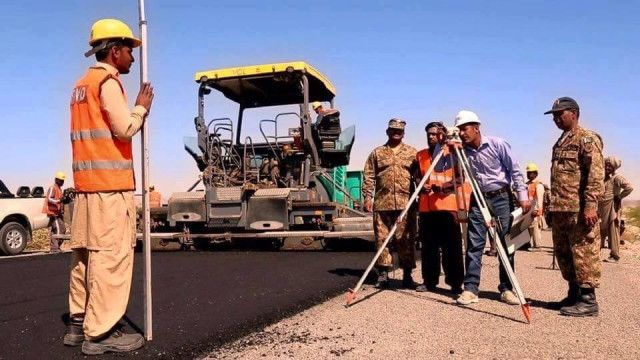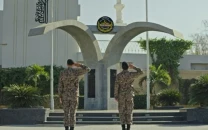Power consumers to pay for CPEC security
The move comes after Dar met army chief to discuss finances for corridor

PHOTO: FACEBOOK
“The ECC approved a summary of the Ministry of Water and Power for issuance of a policy directive to Nepra [National Electric Power Regulatory Authority] to allow 1% of the capital cost (of the project) on account of [CPEC’s] security,” announced Finance Ministry Ishaq Dar after chairing the ECC meeting.
Pakistan aware of hostility towards CPEC
The Ministry of Water and Power’s summary was not part of the official agenda of the ECC, issued on Thursday. Bringing matters that are not part of the agenda on the meeting forum is said to be in violation of Rules of Business of 1973. The chair can allow tabling such summaries only in exceptional matters but this has become a norm, said an official of the Cabinet Division on condition of anonymity.

After the ECC decision, 1% additional cost on account of the CPEC security will be built in the total capital cost of ongoing and upcoming energy projects. The Water and Power Ministry will direct Nepra to make this 1% cost part of tariff determination, which will eventually be recovered from power consumers.
“The amount will be distributed annually starting from the construction period till the term of the Power Purchase Agreement,” said the Finance Ministry. The recovered amount will be paid to the federal government that will pass it on to the military to meet the security expenses of the CPEC, according to a Finance Ministry official.
“In case of new projects, the 1% cost will be built in the total cost while in case of under implementation projects, the cost will be included as ‘variable charges’,” said the official.
There was an official move to seek Chinese financial assistance to meet expenses on CPEC security but they did not agree, said sources in Ministry of Planning and Development. However, Planning Minister Ahsan Iqbal denied that Pakistan asked China to foot the security bill.
CPEC: Chinese work ethic and its implication for Pakistan
“Providing security is our responsibility. They [Chinese] are working in our country,” said Defence Minister Khawaja Asif.
The electricity consumers are already paying various kinds of charges like Neelum Jehlum power project surcharge, Pakistan Television Fee, circular debt interest payment surcharge and power cost recovery surcharge.
The decision came two days after Dar met with army chief General Raheel Sharif to discuss the issues of CPEC security and related expenditures.
Pakistan has decided to raise two special security divisions for the protection of the CPEC –an umbrella project of $46 billion that will link China’s hinterlands with Gwadar –the deep-sea port on Arabian Sea.
Pakistan aware of hostility towards CPEC
The CPEC success is contingent upon the provision of secure environment amid growing challenges posed by arch rival India. On August 31, the army chief announced to set up a second Special Security Division, to be called South SSD that would provide security from Rawalpindi to Gwadar. The first North SSD would ensure CPEC security from Khunjrab to Rawalpindi besides assisting the stakeholders, including provinces, in matters relating to the CPEC.
The ECC also allowed Habib Bank Limited to open a bank branch in Urumqi area of China, as increasing economic cooperation is creating more business opportunities.
Published in The Express Tribune, September 24th, 2016.



















COMMENTS
Comments are moderated and generally will be posted if they are on-topic and not abusive.
For more information, please see our Comments FAQ